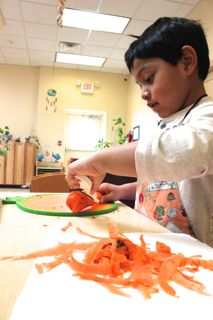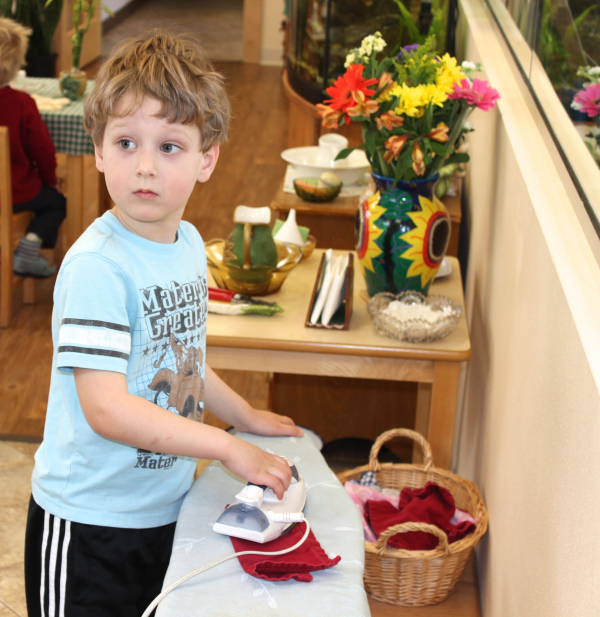Wisconsin Montessori Practical Life Activities
Practical Life exercises are the very foundation of a Montessori “prepared environment.” Practical Life exercises lead to greater concentration, and building of the child’s character.
“Concentration is the foundation for intelligence.”
-- Dr. Maria Montessori
So what is Practical Life and why is there so much importance placed upon it?
If you enter an authentic Wisconsin Montessori classroom environment, you will see something very surprising. Instead of seeing children sitting grouped together receiving information from the teacher, you will see: a child feeding the fish, one or two children preparing snack for the class, a child fully absorbed in making a beautiful flower bouquet, another child happily peeling a potato, another learning how to tie a bow, another child with his whole body involved in scrubbing a table, another washing cloths, watering plants, buttoning, brushing her hair, polishing shoes, wood, or metal, learning how to pour water, spoon beans, and then every one of them cleaning up after themselves – wiping and mopping spills, polishing, picking up beans or dirt from the floor – and replacing everything neatly back upon the shelves. That is not all… you will see these children hang up any wet cloths and replace them with a clean, dry cloth - then you will see the best part - each child will look up, satisfied, and smile.
How is it possible that so many children can be doing so many different things at the same time – without the Guide (teacher) standing over them, telling them what to do, or even saying a word? Instead, the Guide concurrently works individually with yet another child, presenting a new material – while keeping a watchful, observant eye on everyone and everything in the environment.
Dr. Maria Montessori discovered that if a man is shoveling sand, he will gladly give the task to someone else; but if a child is shoveling sand, that child takes great joy in it.
“And joy is the impetus for learning.”
The man shovels sand to restore or build his environment; the child shovels sand to build him or herself. Children have a deep and natural inclination to work, because they are developing and intrinsically creating themselves.
Wisconsin Montessori Practical Life Activities for Everyday Living
 How often do you prepare meals, vacuum the floor, dig in the garden, rake leaves, etc. and your young child clambers to help you? A wise parent takes the time to allow the child a turn, or will devise a way for this small child to work in a grown-up kitchen side-by-side with the adult.
How often do you prepare meals, vacuum the floor, dig in the garden, rake leaves, etc. and your young child clambers to help you? A wise parent takes the time to allow the child a turn, or will devise a way for this small child to work in a grown-up kitchen side-by-side with the adult.
The idea is that children want to work; children learn by doing; and children want to do what they see the adults doing – Practical Life.
So Dr. Maria Montessori designed child-size materials and utensils and implemented them into the Montessori environment. As she observed the delight in the children, she also made her most important discovery - she saw a young child carefully pour just enough water into a vase; she watched a child go through all of the steps of polishing his shoes; she saw another young child carrying a heavy bucket of water across the room after scrubbing a table, she observed another child thoughtfully pruning the leaves of a plant - then it occurred to her - these children were developing skills; practicing them over and over again – repetition; they were motivated – they wanted to do it; they channeled their energy into their work; becoming better and more coordinated; becoming more independent; figuring out the order of the steps involved – What must be done first? And then? And next?
These children exercised their will to help, they put in all of their effort, they judged, they discerned, they problem-solved, they persevered, they completed the tasks, they thought for themselves, they focused and built their concentration.
They were forming their very characters.
